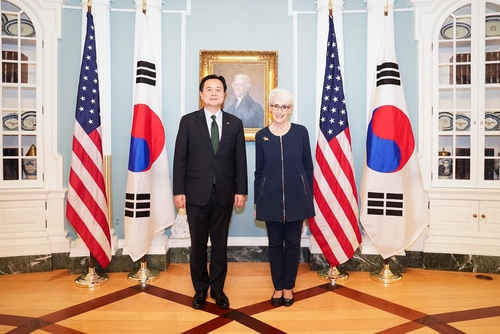- California Assembly OKs highest minimum wage in nation
- S. Korea unveils first graphic cigarette warnings
- US joins with South Korea, Japan in bid to deter North Korea
- LPGA golfer Chun In-gee finally back in action
- S. Korea won’t be top seed in final World Cup qualification round
- US men’s soccer misses 2nd straight Olympics
- US back on track in qualifying with 4-0 win over Guatemala
- High-intensity workout injuries spawn cottage industry
- CDC expands range of Zika mosquitoes into parts of Northeast
- Who knew? ‘The Walking Dead’ is helping families connect
U.S. reaffirms ironclad commitment to security of S. Korea in bilateral talks
U.S. Deputy Secretary of State Wendy Sherman reaffirmed the U.S. commitment to the security and defense of South Korea in talks with her South Korean counterpart Tuesday, Seoul’s foreign ministry said.
Sherman also underscored the “ironclad” U.S. commitment to providing extended deterrence in a bilateral meeting with South Korea’s First Vice Foreign Minister Cho Hyun-dong, according to the ministry.
“The two vice ministers reaffirmed that the complete denuclearization of North Korea is the top priority of South Korea and the U.S., and agreed to continue cooperation between the two countries for ‘real peace’ on the Korean Peninsula,” it said in a press release.

The bilateral meeting came one day after Cho and Sherman held trilateral talks with their Japanese counterpart, Takeo Mori.
In a joint press availability following Monday’s meeting, the South Korean diplomat had insisted that peace without complete denuclearization of North Korea is “fake peace.”
“Deputy Secretary Sherman reaffirmed that the U.S.’ commitment to the defense of South Korea and extended deterrence is ironclad, and the two sides agreed to further step up their efforts to increase the effectiveness of U.S. extended deterrence through the Extended Deterrence Strategy and Consultation Group (EDSCG) to be held this year,” the ministry said in a press release.
Extended deterrence refers to the U.S. commitment to use all its defense capabilities, including nuclear, to help defend its allies.
Seoul and Washington reactivated their bilateral EDSCG late last year after a five-year suspension.
Cho and Sherman stressed the need to fully implement existing United Nations Security Council sanctions on North Korea to rein in Pyongyang’s advancing nuclear and missile capabilities, while agreeing to intensify their joint efforts to curb illicit cyber activities by North Korea.
The U.S. National Security Council has said the North funds up to 30 percent of its resources for its illegal weapons development programs through illicit cyber activities, such as cryptocurrency heists and money laundering, also noting the country had stolen up to US$1 billion in cryptocurrency as of end-2022.
Pyongyang fired an unprecedented 69 ballistic missiles last year, far surpassing its previous record of 25 ballistic missiles launched in a single year.
Seoul and Washington have noted the North may also conduct a nuclear test “at any time,” saying the country appears to have completed all preparations for a nuclear test.
A nuclear test, if conducted, would be the seventh of its kind by North Korea. The country conducted its sixth and last nuclear test in September 2017.
Cho and Sherman also agreed to continue expanding cooperation between their countries in the year that marks the 70th anniversary of the U.S.-South Korea alliance, to a point where the people of both countries can enjoy the benefits of the alliance, the ministry said.
To this end, Deputy Secretary Sherman said the U.S. will continue to work to address South Korea’s concerns over U.S. tax benefits afforded to electric vehicles assembled in North America under the U.S. Inflation Reduction Act, it added.
Cho also met with U.S. Under Secretary of Defense for Policy Colin Kahl, and the two stressed the importance of strengthening the countries’ joint defense against North Korea’s evolving threats, according to the foreign ministry.
They “agreed on the importance of strengthening U.S. extended deterrence while maintaining strong U.S.-South Korea joint defense posture against unprecedented advancements in North Korea’s nuclear and missile threats,” it said of the meeting.
Under Secretary Kahl reaffirmed U.S. commitment to extended deterrence, and the two agreed to enhance the effectiveness of U.S. extended deterrence, it added.
Meeting with reporters later, Cho said his talks with his U.S. and Japanese counterparts here highlighted the deepening cooperation between the three countries.
“The vice ministerial talks held yesterday reaffirmed the countries’ commitment to their joint objective of denuclearizing North Korea and to trilateral cooperation to firmly react to North Korean threats,” he said, while also noting the trilateral meeting marked the third of its kind to be held since President Yoon Suk Yeol took office in May 2022.
Cho insisted the trilateral cooperation has also widened since the South Korean president took office.
“While the joint statement from the meeting in June largely focused on North Korea, it talks not only about the North Korean nuclear threat but also about supply chains, technology cooperation, global health and development this time, showing that the trilateral cooperation is expanding both in size and depth,” he said, referring to his first trilateral meeting with his U.S. and Japanese counterparts held in Seoul in June 2022.








![일본 사도광산 [서경덕 교수 제공. 재판매 및 DB 금지]](http://www.koreatimesus.com/wp-content/uploads/2024/07/PYH2024072610800050400_P4-copy-120x134.jpg)


